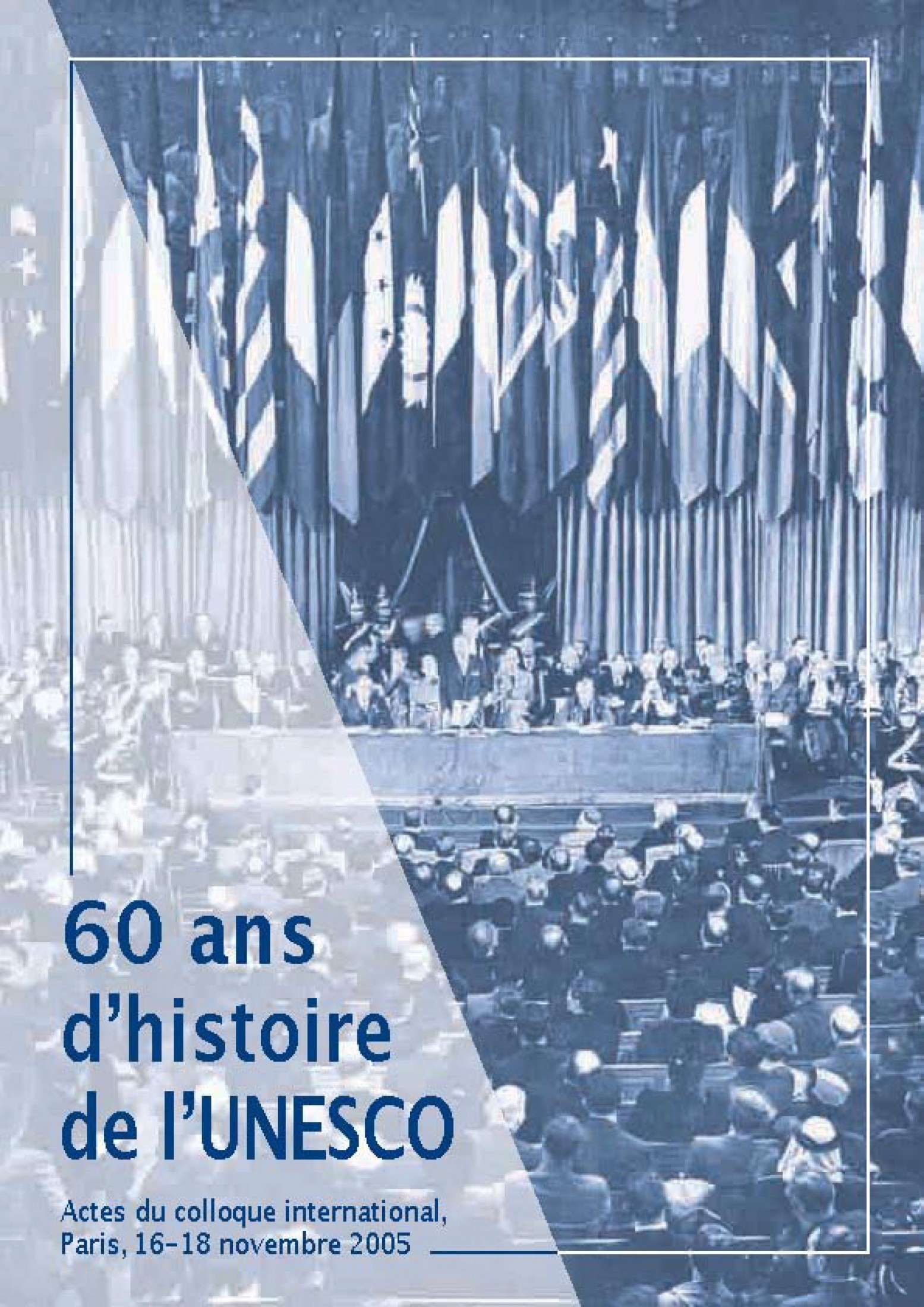This book was published by UNESCO in 2007 and includes the proceedings of the international symposium on UNESCO’s history which took place at UNESCO Headquarters in November 2005, on the occasion of the 60th anniversary of the Organization. This symposium was the first significant activity of the UNESCO History Project, launched by the Director-General in 2004. It was followed by international conferences organized at the universities of Cambridge, Heidelberg and Dakar. 60 ans d’histoire de l’UNESCO was the first major public expression of a movement that aimed at inspiring historians and other scholars to take an interest in the history of UNESCO and in the archives of the Organization. The proceedings have never been published in English; hopefully this will happen at some point.
Parmi les contributions, il est presque impensable de ne pas mentionner la réflexion de Claude Lévi-Strauss, personnalité historique et emblématique de l’UNESCO, qui pendant la cérémonie d’ouverture du colloque analysait et mettait en valeur les liens organiques entre la diversité culturelle et la biodiversité. Au cours des neuf tables rondes du colloque, des sujets qui restent même aujourd’hui au cœur du débat historique, ont été évoqués et discutés, tels que la coopération intellectuelle internationale à travers le 20ème siècle, la lutte contre le racisme, la responsabilité sociale des sciences, le patrimoine culturel mondial, l’éducation universelle comme une idée universelle et la question de la philosophie de l’UNESCO.
Certains textes ont ouvert des pistes de recherche qui ne sont pas encore pleinement explorées. C’est le cas pour la réflexion d’Emma Rothschild sur les archives internationales et celles d’Akira Iriye sur une histoire de la conscience humaine et d’Ibrahima Thioub sur l’UNESCO et le développement en Afrique. Ilya Gaiduk parlait de l’Union soviétique et l’UNESCO pendant la Guerre froide, un thème passionnant qui mérite d’être étudié de façon approfondie ; Ilya Gaiduk n’a pas pu lui-même poursuivre cette recherche en raison de sa disparition prématurée.
60 ans d’histoire de l’UNESCO inclut également plusieurs témoignages d’anciens fonctionnaires, comme René Ochs, Sorin Dumitrescu et Nino Chiappano. Cette inclusion des témoignages au colloque reflète bien le fait que l’engagement et l’activité des membres du personnel, ainsi que toute autre personne ayant contribué à mettre en œuvre les idéaux de l’UNESCO, sont essentiels pour la création même de l’histoire de l’Organisation.
_____
60 ans d’histoire de l’UNESCO / 60 Years of UNESCO History
This book was published by UNESCO in 2007 and includes the proceedings of the international symposium on UNESCO’s history which took place at UNESCO Headquarters in November 2005, on the occasion of the 60th anniversary of the Organization. This symposium was the first significant activity of the UNESCO History Project, launched by the Director-General in 2004. It was followed by international conferences organized at the universities of Cambridge, Heidelberg and Dakar. 60 ans d’histoire de l’UNESCO was the first major public expression of a movement that aimed at inspiring historians and other scholars to take an interest in the history of UNESCO and in the archives of the Organization. The proceedings have never been published in English; hopefully this will happen at some point.
Among the speakers, it is almost unthinkable not to mention Claude Lévi-Strauss, a historical and emblematic figure of UNESCO, who, at the opening ceremony, analysed and highlighted the organic links between cultural diversity and biodiversity. During the nine round tables of the symposium several topics that are still at the heart of historical research on UNESCO were discussed. This was the case for international intellectual cooperation during the 20th century, the fight against racism, the social responsibility of the sciences, universal cultural heritage, universal education as a universal idea and the question of UNESCO’s philosophical outlook and foundations.
Certain texts open new fields of research which have not yet been fully explored. This is the case of Emma Rothschild’s reflections on international archives, those of Akira Iriye on a history of human consciousness, and of Ibrahima Thioub on UNESCO and development in Africa. Ilya Gaiduk spoke about the Soviet Union and UNESCO during the Cold War, a passionating topic that merits to be studied in depth; tragically, Ilya Gaiduk himself was prevented from pursuing this research due to his premature death.
60 ans d’histoire de l’UNESCO also includes testimonies of former UNESCO staff. Among these were René Ochs, Sorin Dumitrescu and Nino Chiappano. The inclusion of these precious testimonies reflect very well the fact that the commitment and work of staff members, and others involved in the Organization, to transform its ideas into actions are essential for the making of UNESCO’s history.





